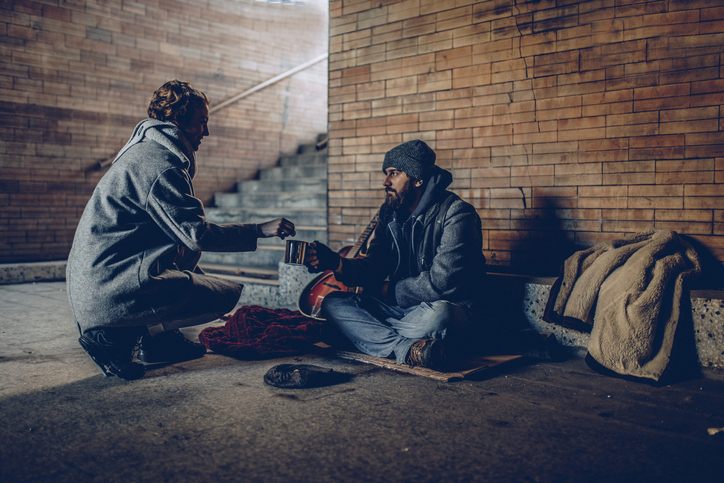It’s pretty much a truism that many (if not most) people are quicker to ask for something than they are to be grateful for that thing once it’s given to them. This is nowhere more apparent than in our prayer lives. A good friend of mine sends me an email at the beginning of each month: “What are the prayer intentions I can help you with this month?” And it’s only relatively recently I realized my response, most of the time, was to ask her to join my prayers of petition.
I’ve been painfully—no pun intended, at least not completely—aware of that lack of balance over the past month. Less than a week before Christmas, I fell and broke my arm, a compound fracture that required several hours of surgery and involved more physical pain than I’ve ever had to endure. I spent a lot of sleepless nights, moaning about how much it hurt and asking God to alleviate the pain. “Please, please, please… just one night. Just one day. Just one hour. Please make it go away.”
Eventually I listened to myself, was suitably chastised, and changed my prayer. “Please help me endure it. Please make me stronger.” Steps in the right direction, for sure, but still a request, a plea, still that pesky “please do something for me.”
When we want something, we want it with our whole being. Sometimes we can’t see anything beyond it. This is apparent in daily life: sometimes we see individuals in single-minded pursuit of power, or wealth, or fame; sometimes we see them begging for a cure for a child’s illness, or for forgiveness from someone they’ve wronged, or for a good death. Whatever it is we want, whether the aim is selfish or altruistic, that desire for “something” is somehow stitched into human DNA; only the saints seem able to overcome it.
Once we get whatever it was we wanted so badly, though, it becomes less of an obsession. We’re on to the next big thing. We forget how much we wanted what we prayed for.
Looking through the lens of my own situation, I do compare this desire—and what happens when it is slaked—to pain. As time has passed, my pain has indeed lessened, to the point where now it’s difficult to remember just how excruciating those December nights were. How I begged God for help. And I know I haven’t thanked him enough for this gradual deliverance—certainly not nearly as often as I petitioned him to make it go away.
In today’s Gospel, Mark tells the story of a leper who asks Jesus to deliver him from his disease. I have to think that wasn’t the first time this man asked for deliverance. Perhaps, like me, he lay awake at night, aware only of his sickness and how he wanted God to make it go away. Perhaps he, too, begged, “please… please… please.”
He reaches out to Jesus and is cured. He gets what he wanted.
The man now can resume the daily life his disease denied him. He can get back to normal. He returns to his village; he shows his priest proof of his cure; he offers initial thanks. But at some level, he has forgotten, already, how absolutely awful it was. He has forgotten what Jesus did for him—at no small personal risk, which we realize as the story unfolds. The man has forgotten the pain of being ostracized, the wounds on his body, the isolation and the fear. And now that he’s back in the social round, despite Jesus having sternly cautioned him not to, he shares his story—with the inevitable result of curtailing Jesus’ ability to move freely and carry on his ministry.
I don’t think this man had evil intentions, or that he wanted to purposely thwart Jesus in any way. I think he was thoughtless, careless, forgetful.
As am I.
Today is my birthday, and I have a great deal to celebrate, a great deal to be grateful for. I had an excellent surgeon. I now have moderately long stretches of time when I am relatively pain-free. I will eventually, like the man in Mark’s story, be able to resume my life much as it was before my fall. Through the grace of God, I will in fact get what I begged him for with such fervor.
But I don’t want to forget the pain. I don’t want to forget the fear, and the sense of helplessness, and the nights I wanted to die because it hurt so much. They’re already receding, and I don’t want them to. I want to remember them so I can offer thanks as much as I once cried out for help. I want to remember them so I can heed Jesus’ words about how to move forward with my life, and not just run off and do whatever I please because I’ve forgotten.
When my friend emails me in a couple of weeks and asks for my prayer intentions for February, this time around I will have a different response. I want her to echo my gratitude. And I will be doing my very best in the meantime… to not forget.

Jeannette de Beauvoir is a writer and editor with the digital department of Pauline Books & Media, working on projects as disparate as newsletters, book clubs, ebooks, and retreats that support the apostolate of the Daughters of St. Paul at http://www.pauline.org.











